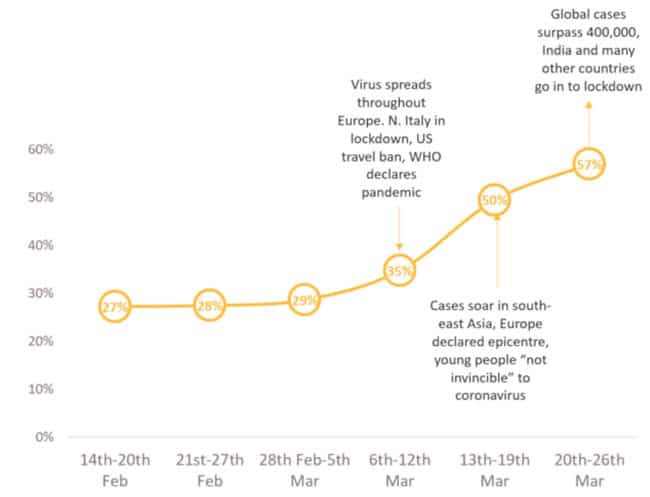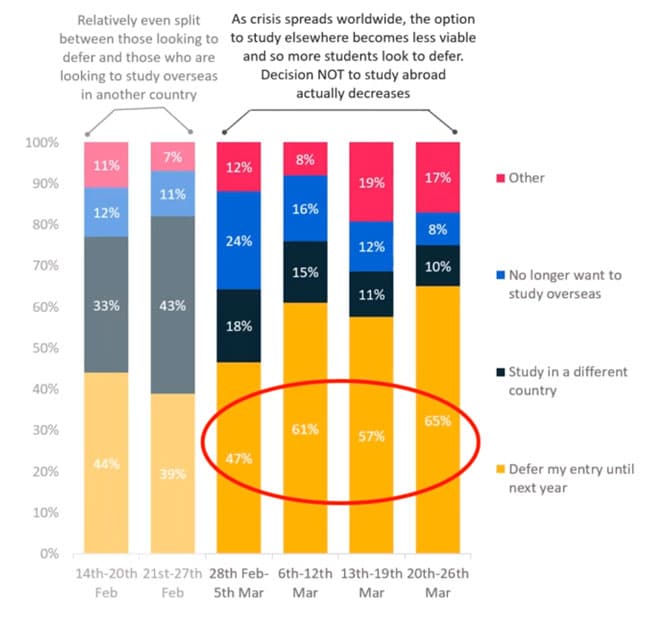New survey data measures student intent for study abroad
- Findings from recent student surveys reflect the growing impact of the pandemic on student intent through February and March, with a growing proportion of students planning to delay programme starts
- However, the survey responses also clearly reflect that most students still intend to follow through on plans for study abroad
As the COVID-19 pandemic continues around the world, there have been a number of attempts to track student intent with respect to study abroad for the balance of this year. Needless to say, international mobility, and teaching and learning of all types, has been badly disrupted this quarter. The questions on everyone’s minds now are how long this can be expected to last, and how are students responding to the rapidly evolving situations in both their home countries and in their intended study destinations.
One early student survey from QS provides some important insights in this respect. The QS survey was first put in the field in mid-February and has gathered more than 11,000 responses from students in the weeks since.
Two important methodology notes about the QS survey:
- All respondents are prospective international students that are, as QS explains, in the “consideration and research” phase of planning for study abroad
- All respondents are planning for university studies abroad, whether for a first degree or for advanced qualifications
With those important qualifiers in mind, the survey results provide an indication of how student planning for study abroad was impacted throughout the month of March.
As the following chart reflects, at the survey’s inception in mid-February slightly less than 30% of responding students indicated that the pandemic would affect their plans for study abroad. Around that same time, another 10-15% of respondents said they were unsure whether their plans would be affected.
As the survey period continued through mid-March – and as the scale of the COVID-19 outbreak became more clear – the proportion of students saying that their plans would be impacted began to grow, passing the 50% mark in the third week of March. During that period, the proportion of students who said they were unsure about how the coronavirus would affect their plans also grew to roughly 30%. This means that, within this survey sample, just about nine in ten students said their plans had been affected, or at least had become more uncertain.

The survey also explored how student planning was being impacted, and we see this reflected in the additional chart below. Tracking student responses week by week from mid-February through end of March, the survey shows a growing proportion of students planning to defer their programme starts to 2021. As of the last week of March, nearly two-thirds of prospective students (65%) indicated that they were planning to delay their studies.
Also of note, the results show through most of March a declining proportion of students saying that they no longer want to study overseas.

The overall picture in the survey findings is that demand for study abroad remains steady with most students planning to following through on their intent to study abroad. But the responses also clearly reflect that most will adjust their plans to begin their university programmes in 2021. This reflects in part the great uncertainty in the marketplace currently with respect to travel restrictions, university and school operations, the economic climate, and more.
Those broad patterns are reflected as well in a separate survey effort from educations.com. Drawing on a smaller sample size of 2,500 students, educations.com found that only a small percentage (4.7%) indicated that they would abandon their study plans.
More than four in ten (43.1%) said they would postpone their studies with another 38.7% saying they did not yet know how their plans would be affected. Keeping in mind that those survey results were mostly gathered around the middle of March, we can imagine that the percentage planning to postpone will have increased in the weeks since in keeping with the QS findings.
But the overall pattern in the survey results is that most students still intend to pursue study abroad, even if they have to delay their studies (in the case of prospective students) or if they have to interrupt their programmes this year to return home earlier than planned (in the case of students already abroad).
The educations.com survey remains open at this time and we will update this post with any further findings that become available.
For additional background, please see:















